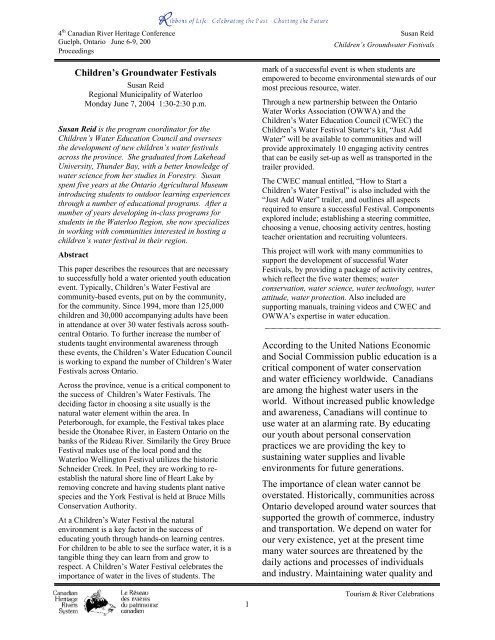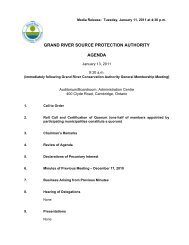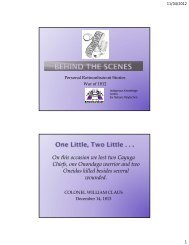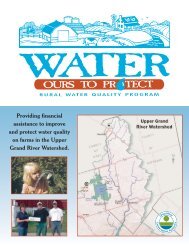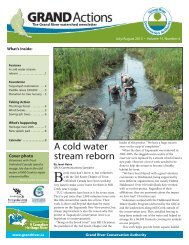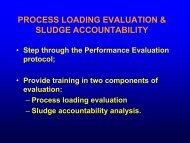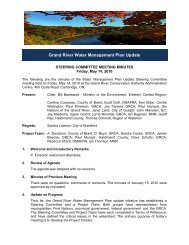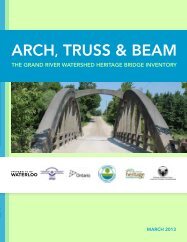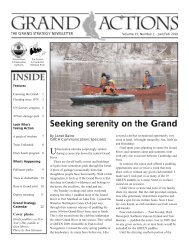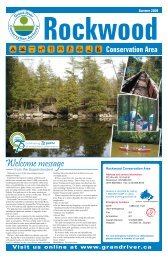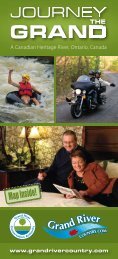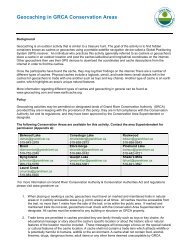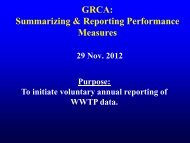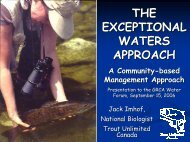Children's Groundwater Festivals - Grand River Conservation Authority
Children's Groundwater Festivals - Grand River Conservation Authority
Children's Groundwater Festivals - Grand River Conservation Authority
You also want an ePaper? Increase the reach of your titles
YUMPU automatically turns print PDFs into web optimized ePapers that Google loves.
4 th Canadian <strong>River</strong> Heritage Conference Susan Reid<br />
Guelph, Ontario June 6-9, 200<br />
Proceedings<br />
Children’s <strong>Groundwater</strong> <strong>Festivals</strong><br />
Children’s <strong>Groundwater</strong> <strong>Festivals</strong><br />
Susan Reid<br />
Regional Municipality of Waterloo<br />
Monday June 7, 2004 1:30-2:30 p.m.<br />
Susan Reid is the program coordinator for the<br />
Children’s Water Education Council and oversees<br />
the development of new children’s water festivals<br />
across the province. She graduated from Lakehead<br />
University, Thunder Bay, with a better knowledge of<br />
water science from her studies in Forestry. Susan<br />
spent five years at the Ontario Agricultural Museum<br />
introducing students to outdoor learning experiences<br />
through a number of educational programs. After a<br />
number of years developing in-class programs for<br />
students in the Waterloo Region, she now specializes<br />
in working with communities interested in hosting a<br />
children’s water festival in their region.<br />
Abstract<br />
This paper describes the resources that are necessary<br />
to successfully hold a water oriented youth education<br />
event. Typically, Children’s Water Festival are<br />
community-based events, put on by the community,<br />
for the community. Since 1994, more than 125,000<br />
children and 30,000 accompanying adults have been<br />
in attendance at over 30 water festivals across southcentral<br />
Ontario. To further increase the number of<br />
students taught environmental awareness through<br />
these events, the Children’s Water Education Council<br />
is working to expand the number of Children’s Water<br />
<strong>Festivals</strong> across Ontario.<br />
Across the province, venue is a critical component to<br />
the success of Children’s Water <strong>Festivals</strong>. The<br />
deciding factor in choosing a site usually is the<br />
natural water element within the area. In<br />
Peterborough, for example, the Festival takes place<br />
beside the Otonabee <strong>River</strong>, in Eastern Ontario on the<br />
banks of the Rideau <strong>River</strong>. Similarily the Grey Bruce<br />
Festival makes use of the local pond and the<br />
Waterloo Wellington Festival utilizes the historic<br />
Schneider Creek. In Peel, they are working to reestablish<br />
the natural shore line of Heart Lake by<br />
removing concrete and having students plant native<br />
species and the York Festival is held at Bruce Mills<br />
<strong>Conservation</strong> <strong>Authority</strong>.<br />
At a Children’s Water Festival the natural<br />
environment is a key factor in the success of<br />
educating youth through hands-on learning centres.<br />
For children to be able to see the surface water, it is a<br />
tangible thing they can learn from and grow to<br />
respect. A Children’s Water Festival celebrates the<br />
importance of water in the lives of students. The<br />
mark of a successful event is when students are<br />
empowered to become environmental stewards of our<br />
most precious resource, water.<br />
Through a new partnership between the Ontario<br />
Water Works Association (OWWA) and the<br />
Children’s Water Education Council (CWEC) the<br />
Children’s Water Festival Starter‘s kit, “Just Add<br />
Water” will be available to communities and will<br />
provide approximately 10 engaging activity centres<br />
that can be easily set-up as well as transported in the<br />
trailer provided.<br />
The CWEC manual entitled, “How to Start a<br />
Children’s Water Festival” is also included with the<br />
“Just Add Water” trailer, and outlines all aspects<br />
required to ensure a successful Festival. Components<br />
explored include; establishing a steering committee,<br />
choosing a venue, choosing activity centres, hosting<br />
teacher orientation and recruiting volunteers.<br />
This project will work with many communities to<br />
support the development of successful Water<br />
<strong>Festivals</strong>, by providing a package of activity centres,<br />
which reflect the five water themes; water<br />
conservation, water science, water technology, water<br />
attitude, water protection. Also included are<br />
supporting manuals, training videos and CWEC and<br />
OWWA’s expertise in water education.<br />
According to the United Nations Economic<br />
and Social Commission public education is a<br />
critical component of water conservation<br />
and water efficiency worldwide. Canadians<br />
are among the highest water users in the<br />
world. Without increased public knowledge<br />
and awareness, Canadians will continue to<br />
use water at an alarming rate. By educating<br />
our youth about personal conservation<br />
practices we are providing the key to<br />
sustaining water supplies and livable<br />
environments for future generations.<br />
The importance of clean water cannot be<br />
overstated. Historically, communities across<br />
Ontario developed around water sources that<br />
supported the growth of commerce, industry<br />
and transportation. We depend on water for<br />
our very existence, yet at the present time<br />
many water sources are threatened by the<br />
daily actions and processes of individuals<br />
and industry. Maintaining water quality and<br />
1<br />
Tourism & <strong>River</strong> Celebrations
4 th Canadian <strong>River</strong> Heritage Conference Susan Reid<br />
Guelph, Ontario June 6-9, 200<br />
Proceedings<br />
Children’s <strong>Groundwater</strong> <strong>Festivals</strong><br />
quantity is extremely important for the<br />
growth and stability of a region.<br />
One of the challenges for a new Festival<br />
Organizing Committee is to acquire or build<br />
activities centres. A fledgling organizing<br />
committee could utilize a pre-packaged set<br />
of proven activities, to experiment with a<br />
pilot Festival and then, work towards<br />
implementing full scale festival in<br />
subsequent years. Now through a bold new<br />
partnership between the OWWA and<br />
CWEC, the Children Water Festival<br />
Starter’s kit, “Just Add Water” will be<br />
available to communities and will provide<br />
approximately 10 activity centres that can be<br />
easily set-up and transported; helping to<br />
encourage Children’s Water <strong>Festivals</strong> across<br />
the province.<br />
CHILDREN”S WATER FESTIVAL<br />
MODEL<br />
Since, 1994 close to 125,000 children and<br />
30,000 accompanying adults have been in<br />
attendance at over 30 water festivals across<br />
south-central Ontario. The first Canadian<br />
Children’s Water Festival was held in<br />
Milton Ontario, after a visit to the Nebraska<br />
Children’s <strong>Groundwater</strong> Festival by a<br />
delegation of interested Canadians.<br />
In 1996, the Water Festival programming<br />
expanded to several communities in Ontario,<br />
including Waterloo, Peel and Metro<br />
Toronto/York. Thanks to continued support<br />
from all the partners, these <strong>Festivals</strong> are<br />
heading into their ninth consecutive year.<br />
Each Festival is constantly evolving and<br />
growing to meet the demands of ever<br />
changing educational needs and<br />
expectations.<br />
The objectives of the Children’s Water<br />
Festival model are simple and<br />
straightforward: educate children about the<br />
importance of our most precious resource,<br />
water, and its life essential qualities. After<br />
recent problems with water quality and<br />
quantity, communities across the province<br />
are studying how best to protect local<br />
groundwater and/or surface water sources.<br />
In Eastern Ontario, their groundwater study<br />
strongly supported education as a tool to<br />
protect the local water source, this led to the<br />
development of three area Children’s Water<br />
<strong>Festivals</strong> which were established in 2002.<br />
<strong>Children's</strong> Water Festival Attendance<br />
(1994 to 2003)<br />
200,000<br />
180,000<br />
160,000<br />
Annual Attendance<br />
Cumultative Total<br />
140,000<br />
Number of Children<br />
120,000<br />
100,000<br />
80,000<br />
60,000<br />
Estimated 2004<br />
Attendance<br />
40,000<br />
20,000<br />
0<br />
1994 1995 1996 1997 1998 1999 2000 2001 2002 2003 2004<br />
Year<br />
2<br />
Tourism & <strong>River</strong> Celebrations
4 th Canadian <strong>River</strong> Heritage Conference Susan Reid<br />
Guelph, Ontario June 6-9, 200<br />
Proceedings<br />
Children’s <strong>Groundwater</strong> <strong>Festivals</strong><br />
The Children’s Water Festival is geared<br />
towards students in grades two through five.<br />
The Festival utilizes more than 40 hands-on<br />
activity centres to teach five main water<br />
themes; water technology, water science,<br />
water attitude, water conservation and water<br />
protection. Activity centres are designed to<br />
be interactive and fun for all the students<br />
who attend.<br />
Figure #1 – Pioneer Water Race helps<br />
children understand historical importance of<br />
water in their lives.<br />
Figure #2 - The Great Water Race children<br />
measures how fast it takes for water to travel<br />
through different soil strata.<br />
Table 1 - Typical Examples of <strong>Children's</strong> Water Festival Activity Centres<br />
Water <strong>Conservation</strong> Activity Centres<br />
• Royal Flush<br />
• 3x's a Day<br />
• Go with the Flow<br />
• Lather Up!<br />
Water Attitude Activity Centres<br />
• Doing the Laundry<br />
• Bucket Brigade<br />
• Pioneer Water Race<br />
• Aboriginal Voices<br />
• Medical Mystery<br />
• Off I Go!<br />
Water Technology Activity Centres<br />
• Simply Divine<br />
• Down the Sewer<br />
• Filter Bed<br />
To host a local Children’s Water Festival<br />
many partners are involved; municipal,<br />
provincial and federal government agencies;<br />
conservation authorities; educators,<br />
secondary and elementary schools and their<br />
boards; and local businesses and industry.<br />
Water Protection Activity Centres<br />
• The Amazing Aquifer<br />
• Enviroscape<br />
• Oil Slick!<br />
• No Water off a Duck's Back<br />
• Friendly Grass!<br />
Water Science Activity Centres<br />
• Porosity and Permeability<br />
• The Great Water Race<br />
• Water Cycle<br />
• Septic Sights!<br />
Each Festival works with many of these<br />
organizations within their community to<br />
build a strong organizing committee.<br />
Developing many community partners helps<br />
to sustain each local Festival, by securing<br />
local funding efforts, in-kind donations,<br />
3<br />
Tourism & <strong>River</strong> Celebrations
4 th Canadian <strong>River</strong> Heritage Conference Susan Reid<br />
Guelph, Ontario June 6-9, 200<br />
Proceedings<br />
Children’s <strong>Groundwater</strong> <strong>Festivals</strong><br />
volunteer recruitment and educational<br />
programming support.<br />
Volunteer organizing committees are the<br />
driving force of a successful Children’s<br />
Water Festival. Local Children’s Water<br />
<strong>Festivals</strong> work with Volunteer Action<br />
Centres to ensure a wide variety of<br />
volunteers at a Festival, ranging in age from<br />
young adults through to seniors. Organizing<br />
Committees work with area high school<br />
teachers to encourage their students to<br />
participate year after year. Secondary<br />
students are core to the volunteer efforts at<br />
the Festival. Since 1994, over 15,000<br />
volunteers have been presenting these<br />
important water messages to the students<br />
attending.<br />
At a Festival, both teachers and students are<br />
provided with a resource kit containing<br />
water related facts, games and activities.<br />
Teacher resources kits included additional<br />
information, and descriptions of each<br />
festival activity. This allows learning to<br />
continue in the classroom and at home.<br />
The success of the Children’s Water<br />
<strong>Festivals</strong> across the province has been based<br />
on numerous factors; the festivals are<br />
designed to be fun and interactive, if<br />
students learn in a fun setting the message<br />
will have a lasting effect. As well, many<br />
people are becoming more concerned about<br />
the environment, especially water. They<br />
want to be more aware about water<br />
conservation and protection for future use,<br />
and at the Festival they learn how water<br />
protection and conservation can be managed<br />
right in their home.<br />
The Festival’s offer unique, interactive,<br />
water education programming which<br />
promotes a “hands-on” learning<br />
environment, delivered in a manner<br />
conducive to two-way learning. Emphasis is<br />
placed on communication to and with<br />
children, and focus is placed on the<br />
translation of technical information into<br />
details which are easily understood by<br />
children of all ages.<br />
By initiating programming at the junior<br />
elementary level, this builds interest in water<br />
science and education at a very early age.<br />
As these children continue to develop<br />
through senior elementary programming,<br />
they will be in a very good position to pass<br />
key messaging along to following<br />
generations in years to come. These<br />
children will grow up to become the next<br />
generation of volunteer leaders at future<br />
Children’s Water <strong>Festivals</strong>.<br />
INSPIRING FUTURE CHILDREN’S<br />
WATER FESTIVALS<br />
By allowing more communities easy access<br />
to the resources to start a Festival, we are<br />
encouraging more youth to become<br />
environmental stewards. For this reason, the<br />
Ontario Water Works Association (OWWA)<br />
and the Children’s Water Education Council<br />
(CWEC) are working to expand the number<br />
of Children’s Water <strong>Festivals</strong> across the<br />
province.<br />
CWEC was formed in February, 2001. Their<br />
mission is to educate children about the<br />
importance of water conservation,<br />
protection, technology and ecology through<br />
a variety of learning environments. One of<br />
CWEC’s objectives is to assist Children’s<br />
Water <strong>Festivals</strong> across the province of<br />
Ontario.<br />
CWEC’s members come from all walks of<br />
life, and contribute a wealth of experience<br />
and knowledge in education, water science,<br />
project and program management,<br />
communication, technical writing, and<br />
conference and workshop facilitation.<br />
CWEC has demonstrated time and time<br />
again that educating children at a young age<br />
is one of the most effective ways to affect<br />
social change. By educating young people<br />
about the importance of our water source,<br />
4<br />
Tourism & <strong>River</strong> Celebrations
4 th Canadian <strong>River</strong> Heritage Conference Susan Reid<br />
Guelph, Ontario June 6-9, 200<br />
Proceedings<br />
Children’s <strong>Groundwater</strong> <strong>Festivals</strong><br />
we are ensuring a legacy of environmental<br />
consciousness for this next generation.<br />
Ontario Water Works Association (OWWA)<br />
is a voluntary membership organization of<br />
about 1300 drinking water professionals<br />
dedicated to protecting public health through<br />
the delivery of safe, sufficient and<br />
sustainable drinking water in Ontario. Since<br />
1916, its members have been supporting<br />
best practices in the stewardship of water<br />
through continuous improvement of<br />
technology, science and management, and<br />
by influencing government policy.<br />
The OWWA Youth Education Committee is<br />
one of the many working committees within<br />
the OWWA striving to achieve its strategic<br />
goals and objectives. The Youth Education<br />
Committee’s mandate seeks to encourage its<br />
water utility membership supporting<br />
Children’s Water <strong>Festivals</strong> across Ontario.<br />
A Children’s Water Festival is typically a<br />
community-based event, put on by the<br />
community, for the community. An<br />
organizing committee is made up of a<br />
number of volunteers from local businesses,<br />
government, not for profit organizations and<br />
the education community who work together<br />
throughout the year in organizing these<br />
<strong>Festivals</strong>.<br />
One of the greatest challenges for a new<br />
Festival Organizing Committee is to acquire<br />
or build activities centres. There are<br />
advantages to fledgling organizing<br />
committee is utilizing a pre-packaged set of<br />
proven activities, to pilot an event. The<br />
events attract new partners and prove<br />
valuable to stakeholders, so as to work<br />
towards implementing full scale festival in<br />
subsequent years.<br />
The starter kit, “Just Add Water”, is being<br />
developed in partnership with CWEC and<br />
OWWA. “Just Add Water” will help create<br />
more <strong>Festivals</strong> across the province; meeting<br />
teachers’ needs to educate their students<br />
about water related issues in a fun outdoor<br />
learning centre.<br />
“Just Add Water” would provide at least 10<br />
activity centres that can be easily set-up and<br />
transported to outlying communities. It<br />
would be transported with the use of a<br />
trailer, so sized that it would be able to be<br />
towed by a standard ½ ton pick-up truck.<br />
The activity trailers would be maintained<br />
and stored through the in-kind sponsorship<br />
of OWWA member water utilities and<br />
municipalities.<br />
The CWEC manual entitled “How to Start a<br />
Children’s Water Festival” is also included<br />
with the “Just Add Water” trailer, and<br />
outlines all aspects required to ensure a<br />
Figure #3 Niagara Children’s Water Festival<br />
5<br />
Tourism & <strong>River</strong> Celebrations
4 th Canadian <strong>River</strong> Heritage Conference Susan Reid<br />
Guelph, Ontario June 6-9, 200<br />
Proceedings<br />
Children’s <strong>Groundwater</strong> <strong>Festivals</strong><br />
successful festival. CWEC and its network<br />
of other Children Water <strong>Festivals</strong> will<br />
provide advice and assistance on how to run<br />
a Festival.<br />
Announced at the time of this paper’s<br />
publication, funding approval has been<br />
granted by the Trillium Foundation for a<br />
multi-year grant, to help develop, build and<br />
administer the Children Water Festival<br />
Starter’s kit, “Just Add Water”, beginning in<br />
2004!<br />
Figure #4 – “Just Add Water” Program Schedule and Scope<br />
Northern Ontario<br />
Six (6) “Just Add Water” Starter<br />
Kits Deployed in 2005 and 2006<br />
Southern, Central & Eastern Ontario<br />
Six (6) “Just Add Water” Starter Kits<br />
Deployed in 2004 and 2005<br />
•$320k over 3 years<br />
•collaborative partnering<br />
between CWEC and OWWA<br />
member water utilities<br />
6<br />
Tourism & <strong>River</strong> Celebrations
4 th Canadian <strong>River</strong> Heritage Conference Susan Reid<br />
Guelph, Ontario June 6-9, 200<br />
Proceedings<br />
Children’s <strong>Groundwater</strong> <strong>Festivals</strong><br />
Conclusion<br />
Education is paramount to the success of<br />
water conservation. The main challenge in<br />
conserving our natural resources is changing<br />
current attitudes and behaviours. Since the<br />
attitudes and behaviours of adults are often a<br />
difficult thing to change, it is our children<br />
that we have to influence. They will grow<br />
up to be the future caretakers of our<br />
resources. Further, children learn easily and<br />
take what they learn home to their families.<br />
In many cases, children can influence other<br />
family members to adopt a more water<br />
efficient behaviour. Therefore, providing a<br />
fun, educational environment for kids to<br />
learn about water is an excellent public<br />
service.<br />
Finally, it is not just the students who learn<br />
from the displays. A fact that is reinforced<br />
through this type of educational<br />
environment, everyone benefits from<br />
learning in an interactive setting.<br />
Volunteers, teachers and parent volunteers<br />
are happy to have the opportunity to gather<br />
information about water conservation, water<br />
protection, new water technologies, water<br />
science and changing water attitudes. Due<br />
to the <strong>Festivals</strong>, people are becoming more<br />
concerned about the environment, especially<br />
water and its protection. Water plays an<br />
essential role in the social, economic and<br />
health of our community.<br />
Acknowledgements<br />
The authors gratefully appreciate the<br />
involvement of all affiliate Children’s Water<br />
<strong>Festivals</strong> from across Ontario, whose<br />
determination and dedication towards<br />
educating our youth, would not have made<br />
this paper possible.<br />
7<br />
Tourism & <strong>River</strong> Celebrations


